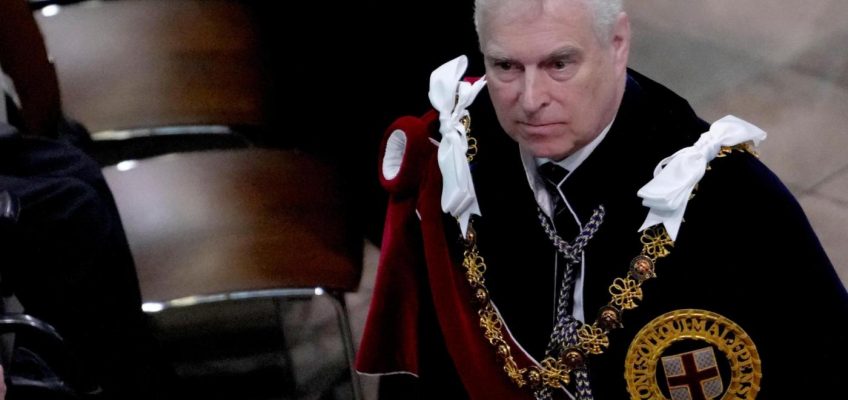By DAVID BAUDER, AP Media Writer
When sifting through the seemingly endless collection of documents in the Epstein files gets to be too much and Ellie Leonard needs a break, she takes a walk outside. Then it’s back to the computer.
The New Jersey mother of four is among hundreds of citizen-journalists, or sleuths, absorbed by the material connected to the late Jeffrey Epstein. She’s determined to learn the stories behind his illicit sex ring and relationships with some of the world’s most powerful people, and publish what she finds on Substack.
“I like a good puzzle,” Leonard said. “I like an investigation. I like things that we have to solve and looking for clues.”
Professional news outlets immediately went to work, sometimes in tandem, when the Justice Department released over three million pages of documents and tens of thousands of visual images on Jan. 30. Hundreds of journalists at The Associated Press, CBS, NBC, MS NOW and CNBC are collaborating to examine the files and share what they find.
Dozens of journalists at The New York Times alone are assigned to examine the documents, using artificial intelligence to speed the process along. Still, the newspaper said last week it had examined only a small percentage of what is there.
That’s where people like Ellie Leonard come in.
There’s plenty of material for the professionals — and amateurs
A steady stream of news stories has emerged as more is found and people and institutions react. Some result in resignations or job losses — the chief legal officer at Goldman Sachs, executive chairman at Hyatt Hotel, chairman of the law firm Paul, Weiss, Rifkind, Wharton & Garrison, government officials in Slovakia and Norway.
SmartNews is one of the independent places selling itself as a reliable source to sum up the reports. “CNN is focused on one angle, Fox is pushing another, Twitter is a mess,” a narrator said in one of its social media ads. “I’m seeing the same story with completely different narratives … Who do I trust?”
With all that, there’s plenty of room for people like Leonard. She’s been journalism-adjacent for much of her career, running a business that offered transcription services until AI rendered it largely obsolete. She worked briefly in education and wrote about politics and social issues on her Substack, The Panicked Writer.
But after seeing the interest generated when she started looking at Epstein documents a few months ago, she began devoting all of her professional time to it.
She describes her glee in spotting, at 1 a.m. after an evening of scrolling, a document involving lawyer Alan Dershowitz and Virginia Giuffre, who alleged sex abuse by several men who knew Epstein. In recent Substack postings, she wrote about what was in a young victim’s journal and email conversations between Epstein and Sarah Ferguson.
Leonard said she looks for nuggets of information others may not be talking about and likes to show how things within Epstein’s wide circle tie together. “I’m putting four kids into the world,” she said, “and I don’t want to see something like this happen again.”
Journalist Wajahat Ali, who runs the Left Hook Substack, said he admires Leonard’s work and often features her on his site. Some of the Epstein citizen journalists gather on livestreams to talk about what they’ve found.
Over the past decade, Ali has watched the growth of a subculture of people obsessed about true crime stories who love to comb through evidence and advance their own theories. Authorities involved in the Arizona search for the missing mother of NBC’s Savannah Guthrie have complained about distractions caused by amateur sleuths.
The Epstein files are “the mother lode,” he said. “If you love conspiracy theories, if you love true crime, this is the ‘Citizen Kane’ of true crime. It is the unfortunately sordid gift that will keep on giving.”
A story that fascinates and repulses
Like Leonard, Anne P. Mitchell and Kassandra Mable Costa have professional backgrounds that have helped them with the Epstein files. Costa, from North Carolina, is accustomed to research in her marketing job. Mitchell is a former law professor from Colorado with an expertise in hunting down legal documents and explaining what they mean in plain language.
Fascinated and repulsed by the story, Costa was drawn to the source material. She doesn’t write about what she’s found. Instead, she uses her skills to help others, collecting evidence for a friend who is trying to get the name of former Maine Sen. George Mitchell removed from an elementary school. The former politician has denied wrongdoing, but the files show he maintained a relationship with the sex offender.
“I am not really politically active,” Costa said. “There are ways that I try to help and ways that I try to create a better world. But I’m not overly political. I’m not looking for conflict, I’m not looking for controversy.”
Anne P. Mitchell’s “Notes From the Front” Substack serves as a connector for Epstein sleuths; she holds chat groups and offers access to a multitude of documents to the few thousand followers who have a paid subscription. “We may have just found a smoking gun,” she writes of a file she’s offering of images that appear to show men with victims. Both Mitchell and Leonard offer some material to followers for free, and sell some to the more obsessed.
Mitchell applauds people who are working through the Epstein files. “The more people who are doing it, the more that is going to come to light,” she said. “But I’m guessing that the more people who are doing it, the more it’s not going to be good for their mental health.”
Unproven accusations emphasize the need to verify facts
Matthew LaPlante, a journalism professor at Utah State University, said having more citizens using reportorial skills — whether they know it not — can benefit society. He cited Minneapolis residents who used phones to document immigration enforcement efforts.
The downside, he says, is that few of these people are trained in the painstaking task of verifying facts — or, for that matter, who understand the legal implications of publishing rumors. The New York Times, in a story that explained to readers how it is examining the material, stressed this need for care. “We don’t publish anonymous information that we can’t verify ourselves,” the newspaper said.
6 planets will parade across the night sky at the end of February
Police are finding suspects based on their online searches as courts weigh privacy concerns
Trial begins for Utah mom accused of killing husband then writing a children’s book about grief
Powerful winter storm roils travel across the US, leading to thousands of flight cancellations
Armed man shot and killed at Mar-a-Lago was never interested in politics or guns, cousin says
LaPlante pointed to one Substack post last week with more than a dozen videos from the file, most partly redacted and making little sense without any context — like one of two unidentified men writing on a sex doll.
Many unproven accusations, some outlandish, are included in the Epstein files. How much of that unvetted material will find its way into the public discourse — to say nothing of false or doctored information created by the unscrupulous?
“What is in the files is damaging enough,” Ali said. “You don’t need to indulge in conspiracy theories. It would be a disservice to the survivors and would hurt the credibility of what is already there.”
There’s enough to keep the curious occupied — professional and amateur alike. Potentially, there’s more new or unredacted material to come.
“I hope I’m around for 15 or 20 years,” said Mitchell, who is largely confined to her home due to health issues. “Because I really think it’s going to take that long for the full extent of this to be exposed.”
David Bauder writes about the intersection of media and entertainment for the AP. Follow him at http://x.com/dbauder and https://bsky.app/profile/dbauder.bsky.social.




